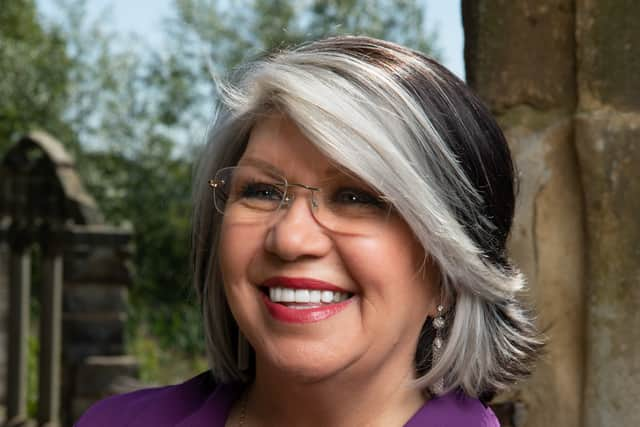Publish and be northern: How and why publishers and literary agents are trying to level up the book industry
and live on Freeview channel 276
Much like the train from Manchester to Leeds, the north’s bid to level up the publishing industry is a slow and trundling journey with more stops and delays than HS2. But unlike the axed high speed rail plans, and in all corners of the north, this revolution IS happening - albeit gradually.
According to the ‘A Year in Publishing’ report by the Publishers’s Association (published April 2023), statistics showed growth for the sector nationally in 2022, with total sales for the UK’s publishing industry reaching £6.9billion- a rise of 4% from 2021. A record-breaking 669 million physical books were sold with an eight per cent increase in export to £4.1 billion.
Advertisement
Hide AdAdvertisement
Hide AdBut it’s not all smelling of roses as Publishing Weekly reported sales of print books were basically flat in the first quarter of 2023 compared to 2022. They finished the first half of the year down 2.7% - and that’s despite the early year boost provided by Prince Harry’s ‘Spare’.
Milly Johnson, bestselling author of Together, AgainI have been hoping and praying since ( my career began) that the literary scene in the north would rise because we have such talent up here, such wit and grit and so many places to write about. At last it’s happening.
So how is the north faring in this highly competitive marketplace? London’s grip on the publishing industry means everything has revolved around the capital for centuries amid the historic mystique and romanticism of Bloomsbury and many other bookish neighbourhoods. England’s first publisher William Caxton set up in Westminster Abbey in 1487 and, in reality, most large publishers are still based within a few tube stops.
It’s only over the past decade attempts have been made to redress the balance, an evolution slowed by Covid, which reduced the demand for traditional office space and caused havoc for the industry. Nonetheless, some large publishers have opened satellite offices out of London including Harper North (Harper Collins) and Hachette in central Manchester. The latter has also opened offices in Newcastle and Sheffield, even stating on the website it is ‘Historically very London-centric’ and pledging change.
But, arguably, the real renaissance comes from the independents (publishers and agents) who are proudly shouting about myriad stories and voices. Rooted in the north’s cities and towns, they have gone from strength to strength, fighting to prove you can be small - and mighty - by working together.
Advertisement
Hide AdAdvertisement
Hide AdThe Liverpool Literary Agency, which popped up as the city’s first agency under lockdown, focuses on under-represented people in the north. Boasting a four-strong team headed up by founder Clare Coombes, it has writers on the books from North-East based Emma Whitehall, to Liverpool’s Michael Sellars.


The agency is currently celebrating some big wins with Liverpool author Ashleigh Nugent who has scooped a deal with Picador/Pan McMillan and a TV option for Locks, a novel based on his being arrested as a 17-year-old while on holiday in Jamaica. Clare and screenwriting agent Marc Simonsson of SoloSon Media Limited brokered the deal with 2LE Media.
Clare told peopleinpublishing.com in 2021 her motivation in setting up the agency was to make voices like Ashleigh’s heard. In 2023 those ambitions are coming true. She said: “ I really wanted to help other writers break into publishing, especially as there was no literary agency in Liverpool. It definitely looked like a case of confidence, contacts and cost being a barrier for many northern writers (and for me).” In other strides forward the agency is imminently holding two free events to promote Water Street by JP Maxwell (John Maxwell) and Ashleigh Nugent, visiting libraries at Kirkby & Huyton to inspire writers.


Meanwhile independent publishing houses are flourishing - from Liverpool’s Comma Press, to Sheffield’s And Other Stories, Manchester-based Saraband , Valley Press in Scarborough, Bluemoose Books in Hebden Bridge, West Yorkshire.. There are many more, from the Preston-based University of Central Lancashire (UcLan) publishing, to Carcanet in Manchester, Honford Star in Stockport, Stairwell Books in York and Smokestack Books in Ripon.
Advertisement
Hide AdAdvertisement
Hide AdMany of these have been pulled together as a unit by the Northern Fiction Alliance, and they are working together to shout louder about voices which may previously have remained unheard. On its website, it shares a powerful Open Letter with an eight point plan to challenge the London-centric model and it’s fighting talk.
It states: “How much talent do we lose because, for a lot of people, London is too expensive, too far away, or frankly, too chaotic to move to?” And it goes on: “What could be bolder, more transformative, than bursting the publishing bubble?” The eight points range from a commitment to publish more regional writers, to paying interns the living wage, to mentoring of publishing professionals and setting up a regional office.
But as Hazel Holmes from UcLan Publishing, based at the Uclan campus in Preston, explains - it’s not plain sailing despite recent award nominations including The Week Junior Book Awards with Liz Flanagan’s Wildsmith. She said: “One of the reasons we set up the Northern YA Literary Festival was to make books, creativity and the publishing industry more accessible to people in the North. We’re really saddened not to have received Arts Council funding and are currently thinking about other stable and permanent sources for funding.
“I’m also quite wary of Manchester becoming a focus for the Northern Publishing scene which is a little frustrating. The North is vast, and holds a wealth of talent. The cost of city living or commuting just isn’t viable for most. “
Advertisement
Hide AdAdvertisement
Hide AdAn open letter to the London-centric Publishing Industry, by Northern Fiction AllianceBy moving away from traditional publishing centres, together we can reshape and redefine the current literary landscape
Barnsley-based Milly Johnson, best-selling author of 21 novels includingTogether, Again, thinks progress is welcome and long overdue. She said: “When I started writing, I took a chance because no-one was really writing about the north, everything was London-centric. I was cocky enough to think that if Barry Hines (from Barnsley) and Catherine Cookson (northern, female, over forty) could do it, maybe there was a path trodden that I could follow.


“So I embraced my northernness and ironically what I had thought, for so many years, would hold me back was what propelled me forward - so there’s a lesson. I have been hoping and praying since that the literary scene in the north would rise because we have such talent up here, such wit and grit and so many places to write about - and a need from readers for writers who represent the people of the north and their lives here. At last it’s happening. Publishers are realising the worth of having accessible bases up here and northern writers are more confident that their voices are being sought after.
“Not before time.”
Comment Guidelines
National World encourages reader discussion on our stories. User feedback, insights and back-and-forth exchanges add a rich layer of context to reporting. Please review our Community Guidelines before commenting.
